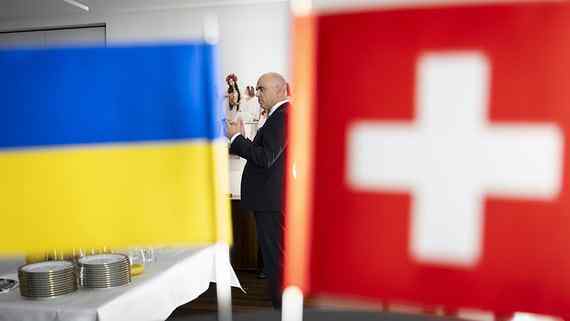Swiss Conference on Ukraine: What are India’s stakes in it?
The Swiss Conference is meant to “jointly define a roadmap on how to involve both parties in a future peace process.”

By Asoke Mukerji
The objective of Switzerland in hosting the conference on Ukraine on 15-16 June 2024 is to agree on a “jointly supported foundation for future negotiations”. Recent reports from the Swiss side indicate that Ukraine’s objectives from the Swiss Conference are focused on food security (the export of agricultural products from Ukraine), nuclear safety (especially nuclear power plants), and the exchange of prisoners of war and deportees.
The Swiss Conference is meant to “jointly define a roadmap on how to involve both parties in a future peace process.” Countries invited to participate, like India, are expected to speak on these topics. Their views will presumably be integrated into the final declaration of the Conference.
Participation by India, at any level, will make it a party to the Conference’s declaration. India’s view that “this is not an era of war” logically implies prioritizing a negotiated peace. So far, India’s initiatives on facilitating a negotiated peace between Ukraine and Russia have been outside the public domain. Two major obstacles for any peace initiative are the fact that Ukraine has a Presidential decree since October 2022 prohibiting peace negotiations with Russia, and that the NATO military alliance backing Ukraine militarily, financially, and technologically, has not endorsed any negotiated peace between Ukraine and Russia till now.
To retain the momentum of India’s transformation into a major power, India’s participation needs to be substantive, not cosmetic, so that the Swiss Conference does not undermine India’s larger effort to become a reliable voice in international relations in its own right. Only then can India aspire to participate on an equal basis with other world powers in decisions of the international community. This has a direct bearing on India’s call for reforms in the decision-making methods of bodies like the UN Security Council, where India’s declared objective is to become a permanent member with equal rights as the other permanent members, including China.
In substantive terms, India could be expected to raise two major issues during the Conference. First, the Conference will have to take a position on why the only UN Security Council-endorsed peace framework for Ukraine, which are the Minsk Agreements, are not being implemented. Participants, including the signatories of the Minsk Agreements present at the Conference, including the permanent members of the UN Security Council, will need to spell out the rationale for not adhering to the unanimous UN Security Council decision of February 2015 aimed at a lasting political settlement of the main issues that led to the outbreak of this conflict in the first place. This is important to account for responsibility for the huge number of human casualties, military and civilian, of the conflict so far. If UN Security Council resolutions do not have the legitimacy given to them by the UN Charter and international law, then India’s core interest in being part of the UN structures, and in seeking equitable representation in bodies like the UN Security Council, will be significantly dented.
The second issue is the increasing pressure on sovereign countries to weaponize the interlinked, globalized economic networks by the extra-territorial application of domestic sanctions legislated by stronger states. This is directly linked to the issue of food security on the agenda of the Conference. India is party to numerous international decisions opposing the extra-territorial application of domestic laws. Opposition to the extra-territorial application of domestic laws is central to India’s own independence movement and freedom from British colonial rule. The Swiss Conference will need to express a view on the unilateral application of economic sanctions due to the Ukraine conflict, if India is to be a party to the Conference declaration.
In order for the Swiss Conference to become a pathway to a negotiated peaceful settlement of the Ukraine conflict, the other party to the conflict, which is Russia, has to participate in the peace process. The human dimension makes this clear. The UN reports that about 6 million Ukrainians have become international refugees due to the conflict so far. Of these about 1.2 million Ukrainians have applied for asylum in Russia, and 2.85 million Ukrainians have crossed the Ukraine-Russia border since 22 February 2022. Both the Minsk Agreements, and the fact that Russia is hosting millions of Ukrainian refugees due to the conflict, make Russia’s equal participation in the Swiss Conference process imperative for a successful outcome of laying “the foundations” for a sustainable peace in the region.
India’s experience of the last time it participated in such an international initiative taken by the Western powers is instructive. The Bonn Peace Conference on Afghanistan held in 2001 led to the eventual investment of billions of dollars of Indian money into the reconstruction, revival, and sustainable development of Afghanistan. Valuable Indian lives, including those of senior Indian military and diplomatic personnel, and contractual labour, were sacrificed in this process. However, this significant investment was washed away by the unilateral decision of the Western sponsors of the Bonn Conference to walk away from Afghanistan on 15 August 2021. In one stroke, India’s strategic and economic interests in Afghanistan were erased by some of India’s “strategic partners” without prior consultation with India. The explicit linkage between withdrawal of support for Afghanistan and extension of support for Ukraine made by the White House in April 2023 raises a legitimate question. What is the guarantee a similar fate will not befall any Indian decision to be part of the Western-initiated reconstruction and revitalization of Ukraine plan during the Swiss Conference, unless it is part of a negotiated Ukraine-Russia peace agreement?
The author is Former Representative of India to the United Nations .